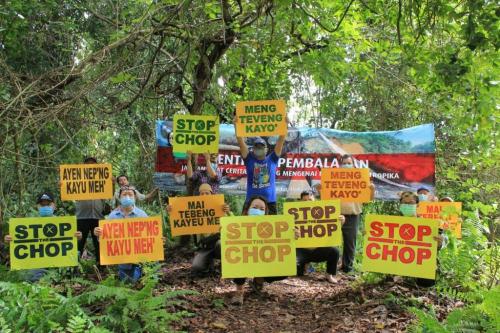
https://borneoproject.org/communities-fighting-deforestation-push-for-in...
(Brussels, May 31, 2024) – press release via Human Rights Watch
The European Commission should include independent civil society groups in ongoing key talks with Malaysia and Indonesia over its anti-deforestation rules, a delegation of Indigenous, human rights, and environmental organizations said today.
In June 2023, the two Southeast Asian countries formed a task force with the European Commission to resolve tensions over the implementation of a vital new European Union law to tackle global deforestation. But frontline organizations representing the rights of communities affected by deforestation have largely been left out of the task force meetings.
“We are hopeful that the EU deforestation law will support us to advance human and environmental rights locally – especially as policies to safeguard these rights are still lacking for us,” said Celine Lim, managing director of SAVE Rivers, an Indigenous organization from Sarawak, Malaysia.
The delegation, which is meeting with EU officials in Brussels through May 31, 2024, consists of members from SAVE Rivers, RimbaWatch, Bruno Manser Fonds, KERUAN, and Human Rights Watch.
The European Union Deforestation-free Products Regulation (EUDR), adopted in May 2023, restricts the sale of certain products on the EU market if they are linked to deforestation or violations of land rights or human rights. Malaysia and Indonesia are the world’s biggest producers of palm oil and significant exporters of timber to the EU. The regulation covers both commodities.
The joint task force convened in Jakarta in August 2023 and again in Brussels in February 2024, with another meeting set for Brussels in September. The task force needs to hear from frontline communities most affected by deforestation and environmental organizations in their countries to genuinely understand the impact of the palm oil and timber industries, the delegation said.
“It is essential for Malaysian civil society to be engaged in the EUDR process to ensure that implementation of the law is underpinned by transparency and fact,” said Adam Farhan, director of the environmental nonprofit group RimbaWatch, based in Kuala Lumpur, Malaysia. “As a climate watchdog, we have found that Malaysian authorities severely underreport deforestation – through consultation with civil society, data gaps like this can be addressed.”

Local groups in Indonesia and Malaysia have done important work on issues related to the EU Deforestation-free Products Regulation, such as monitoring areas at risk of deforestation, investigating flaws in palm oil and timber certification schemes, and assisting communities with the mapping of ancestral land. Their research consistently shows that poor regulation and oversight of the timber and palm oil industries has enabled companies to routinely encroach on Indigenous territories and violate rights.
Research by RimbaWatch using open-source data showed at least 3.2 million hectares of natural forest are still under threat of conversion in Malaysia, well past the European regulation’s December 31, 2020, cutoff date. SAVE Rivers has spearheaded a campaign, Stop the Chop, calling for the end of logging in Indigenous territories in Sarawak. The Borneo Project and Bruno Manser Fonds published a report in November 2023 that found that Malaysian timber can receive sustainability certification despite reportedly being harvested on land claimed by Indigenous peoples.
In 2023, Human Rights Watch conducted research on the impacts on Indigenous rights of the logging and palm oil industry in Malaysia and met with Malaysia’s federal Plantations and Commodities ministry in Kuala Lumpur.
“Civil society has the capacity to collect field data, document violations, and report them,” said Sayyidatiihayaa Afra, researcher at Satya Bumi. “Excluding civil society from the EUDR implementation process hinders the resolution of technical and factual problems on the field.”
In Indonesia, Satya Bumi, a nonprofit environmental organization, has found that the country’s traceability systems cannot prevent the mixing of legal and illegal commodities, and that 2.6 million hectares of natural forest are under permits that could pave the way for future deforestation. Human Rights Watch has previously exposed how palm oil companies have deforested traditional territories, leaving several Indigenous communities destitute in Kalimantan and Sumatra, Indonesia. Palm oil companies’ practice of draining peatlands in Indonesia further contributes to the industry’s negative climate impacts.
“The task force needs to hear from the frontline communities most directly affected by deforestation in Indonesia and Malaysia, and the environmentalists working to conserve their countries’ invaluable natural heritage,” said Luciana Téllez Chávez, senior environment researcher at Human Rights Watch.
For more information, please contact:
In Brussels, Luciana Téllez Chávez (English, Spanish): +1-646-819-9079 (mobile); or
tellezl@hrw.org. Twitter: @lucianatellez
In Brussels, Celine Lim, Managing Director at SAVE Rivers (English, Bahasa Malaysia): +60-
19-885-7981 (mobile); or manager@saverivers.com.
In Brussels, Adam Farhan, Director at RimbaWatch (English, Bahasa Malaysia): +60-12-507-
0669 (mobile); or admin@rimbawatch.com.
In Jakarta, Sayyidatiihayaa Afra, Researcher at Satya Bumi, (English, Bahasa Indonesia):
hayaa@satyabumi.org.









